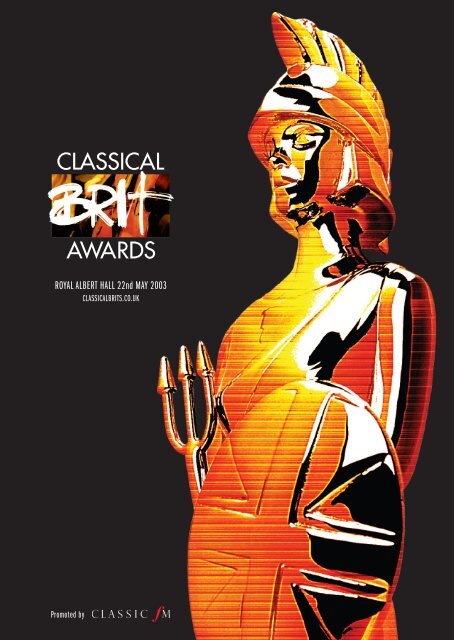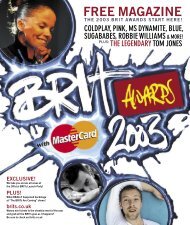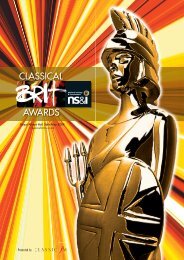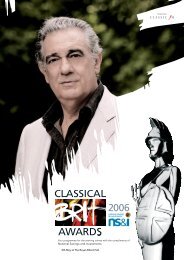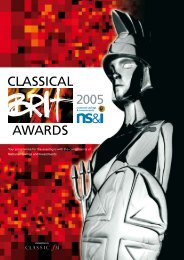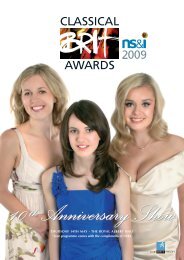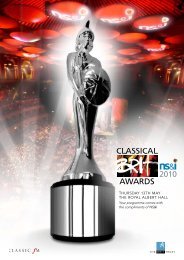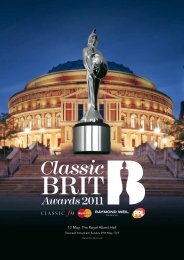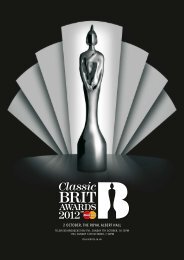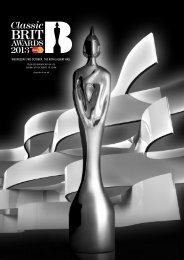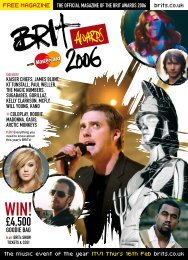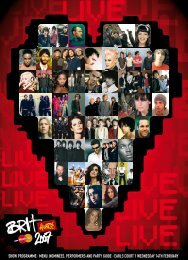The BRIT Classic Awards 2003 - Show Programme
The Classical BRIT Awards Show programme was distributed to guests and performers at the Royal Albert Hall. A snapshot of the very best of British Classical music, including all the nominees and performers.
The Classical BRIT Awards Show programme was distributed to guests and performers at the Royal Albert Hall. A snapshot of the very best of British Classical music, including all the nominees and performers.
You also want an ePaper? Increase the reach of your titles
YUMPU automatically turns print PDFs into web optimized ePapers that Google loves.
ROYAL ALBERT HALL 22nd MAY <strong>2003</strong><br />
CLASSICAL<strong>BRIT</strong>S.CO.UK<br />
Promoted by
MURRAY<br />
PERAHIA<br />
CHOPIN:<br />
Études Op.10 & Op. 25<br />
SK 61885<br />
Gramophone Record of the Month<br />
(October 2002)<br />
Also Available:<br />
New from six times Gramophone Award Winner,<br />
Murray Perahia<br />
SCHUBERT:<br />
Piano Sonatas Nos. 19 (D. 958), 20 (D. 959)<br />
& 21 (D. 960)<br />
S2K 87706<br />
www.murrayperahia.com<br />
Sony <strong>Classic</strong>al, 10 Great Marlborough Street, London, W1F 7LP
Performers<br />
top to bottom:<br />
Andrea Bocelli<br />
Bond<br />
Aled Jones<br />
Cecilia Bartoli<br />
Maxim Vengerov<br />
Dominic Miller<br />
Bryn Terfel<br />
CONTENTS<br />
04 <strong>Classic</strong>al <strong>BRIT</strong> <strong>Awards</strong> Welcome,<br />
the ECO and conductor Simon Wright<br />
05 Katie Derham, classical passion<br />
06 Cecilia Bartoli, pure class<br />
07 Bryn Terfel, Welsh prince of song<br />
08 Aled Jones, back at the top,<br />
Bond, for your eyes only<br />
09 Maxim Vengerov, breathtaking virtuosity<br />
10 Dominic Miller, smooth classics,<br />
Andrea Bocelli, heart-throb tenor<br />
11 <strong>The</strong> <strong>BRIT</strong> School and <strong>The</strong> <strong>BRIT</strong> Trust<br />
THE AWARDS<br />
14 Female Artist of the Year<br />
15 Male Artist of the Year<br />
17 Album of the Year<br />
19 Critics’ Award<br />
21 Young British <strong>Classic</strong>al Performer<br />
22 Ensemble/Orchestral Album<br />
23 Contemporary Music Award<br />
AT-A-GLANCE GUIDE<br />
24 <strong>The</strong> <strong>Classic</strong>al <strong>BRIT</strong> <strong>Awards</strong> nominations in full<br />
<strong>The</strong> <strong>Classic</strong>al <strong>BRIT</strong> <strong>Awards</strong> <strong>2003</strong>, whilst<br />
astonishingly only in its fourth year has<br />
become a major event in the UK music<br />
calendar. With television audiences in excess<br />
of three and a half<br />
million, it has already<br />
played host to some of<br />
the greatest names in<br />
<strong>Classic</strong>al Music today,<br />
such as Nigel Kennedy,<br />
Sir Simon Rattle, Angela<br />
Gheorghiu, Lesley<br />
Garrett and Magdalena<br />
Kozena, together with<br />
some of the biggest<br />
names in <strong>Classic</strong>al crossover including Andrea<br />
Bocelli, Russell Watson, Vanessa–Mae and<br />
Bond. This year’s event has another incredible<br />
line up. Wonderful performances in a magical<br />
setting is the blue print for the <strong>Classic</strong>al <strong>BRIT</strong>s<br />
and as the awards and the show grow, we<br />
look forward to achieving new heights.<br />
Rob Dickins<br />
<strong>Classic</strong>al <strong>BRIT</strong> <strong>Awards</strong> Chairman<br />
classicalbrits.co.uk<br />
<strong>The</strong> <strong>Classic</strong>al <strong>BRIT</strong> <strong>Awards</strong> 2002<br />
WATCH THE CLASSICAL <strong>BRIT</strong> AWARDS <strong>2003</strong><br />
ITV ONE ON THE 1ST OF JUNE<br />
WHAT’S ON<br />
Introduced by your show host Katie Derham<br />
Bond Performing<br />
• Allegretto<br />
Presentation<br />
YOUNG <strong>BRIT</strong>ISH CLASSICAL<br />
PERFORMER OF THE YEAR<br />
Andrea Bocelli Performing<br />
• Aranjuez<br />
• Ochi de Fata<br />
Presentation<br />
ENSEMBLE/ORCHESTRAL<br />
ALBUM OF THE YEAR<br />
Dominic Miller Performing<br />
• Albinoni Adagio<br />
• Bach Mass in B Minor & Shape of my Heart<br />
Presentation<br />
CONTEMPORARY MUSIC AWARD<br />
Presentation<br />
BEST SELLING CLASSICAL ALBUM<br />
Cecilia Bartoli Performing<br />
• Anch’il mar par che sommerga<br />
INTERVAL<br />
Maxim Vengerov Performing<br />
• Les Rondes des Lutins<br />
• Tzigane<br />
Presentation<br />
CRITICS’ AWARD<br />
Presentation<br />
MALE ARTIST OF THE YEAR<br />
Bryn Terfel Performance<br />
• Shanandoh<br />
Presentation<br />
FEMALE ARTIST OF THE YEAR<br />
Aled Jones Performing<br />
• Vespera<br />
• Pökarekare ana (Duet: Hayley Westernra)<br />
Presentation<br />
ALBUM OF THE YEAR<br />
Presentation<br />
OUTSTANDING CONTRIBUTION<br />
TO CLASSICAL MUSIC<br />
Andrea Bocelli & Bryn Terfel Performing<br />
• Au fond du temple saint<br />
FINALE: <strong>The</strong> English Chamber Orchestra<br />
All performances subject to change<br />
3
Welcome<br />
Great artists from the classical world<br />
have travelled from near and far to<br />
the Royal Albert Hall tonight to create<br />
what promises to be a sensational mix<br />
of fine music making and thoroughly<br />
compelling entertainment.<br />
Conductors, singers, instrumentalists and<br />
composers are all in the running for one<br />
or more of the seven coveted <strong>Classic</strong>al<br />
<strong>BRIT</strong> <strong>Awards</strong>, with everyone from grandees<br />
of the classical establishment to exciting<br />
newcomers among the nominees. Diversity<br />
and versatility have become essential<br />
requirements for today’s classical stars,<br />
practised across the board by artists who<br />
once would have been expected to follow<br />
narrow career paths. Sir Simon Rattle’s<br />
innovative programming, Cecilia Bartoli’s<br />
explorations of 18th-century rarities, Bryn<br />
Terfel’s move into Broadway territory,<br />
John Williams’ unforgettable Hollywood<br />
soundtracks, and the boundary-crossing<br />
work of Andrea Bocelli, Bond or Lesley<br />
Garrett have placed the classics within<br />
reach of a massive new audience. Above<br />
all, tonight’s show proves beyond doubt<br />
that first-class classical music is for the<br />
many, not the few.<br />
Lesley Garrett<br />
ECO & Simon Wright<br />
<strong>The</strong> sumptuous sound and rhythmic<br />
energy at the heart of this year’s<br />
<strong>Classic</strong>al <strong>BRIT</strong> <strong>Awards</strong> comes courtesy<br />
of the show’s resident band, the English<br />
Chamber Orchestra.<br />
Since last year’s awards, the orchestra has<br />
performed in Provence, taken to Caribbean<br />
waters on an idyllic music cruise in company<br />
with top classical soloists, violist Yuri<br />
Bashmet and cellist Steven Isserlis among<br />
them, and appeared in concerts throughout<br />
the UK with the likes of everybody’s<br />
favourite early music soprano Emma Kirkby<br />
and violin legend Igor Oistrakh.<br />
Founded in 1960, the ECO has earned<br />
a distinguished place in the history of<br />
British music making, raising awareness<br />
of neglected baroque masterpieces and<br />
introducing important new works to the<br />
classical repertoire. Sir Colin Davis, one of<br />
tonight’s nominees, conducted the orchestra<br />
on its first national tour in 1961. In the same<br />
year, Benjamin Britten began an association<br />
with the ECO that lasted until his death in<br />
1976. Other key partnerships include those<br />
in the 1970s with classical music’s golden<br />
couple, Jacqueline du Pré and Daniel<br />
Barenboim, and violinist Pinchas Zukerman.<br />
In 1981 a television and radio audience,<br />
estimated at one billion people, tuned in to<br />
catch what must rank as the band’s biggest<br />
gig, when they played at the wedding of <strong>The</strong><br />
Prince of Wales and Lady Diana Spencer.<br />
Sunderland-born Simon Wright, a<br />
multi-talented former pupil of Manchester’s<br />
Chetham’s School and Royal Northern<br />
College of Music, takes on tonight’s<br />
conducting duties. Simon’s northern musical<br />
roots run deep. As a lad he worked as<br />
accompanist with the Hallé Choir, learning<br />
the conductor’s trade by watching Sir John<br />
Barbirolli extract the last drops of passion<br />
and energy from a chorus of seasoned<br />
amateur singers. After college, he crossed<br />
the Pennines to become organist at<br />
Ampleforth Abbey, and has been Conductor<br />
and Artistic Adviser of the Leeds Festival<br />
Chorus since 1975. Prize-winning success<br />
in the 1986 Leeds Conducting Competition<br />
led to engagements with many of Britain’s<br />
leading orchestras, the Philharmonia, BBC<br />
Philharmonic, Royal Liverpool Philharmonic,<br />
English Northern Philharmonia and Northern<br />
Sinfonia among them.<br />
Simon Wright<br />
4
ITV’s Katie Derham says that snobbery is a<br />
thing of classical music’s past, and reveals why<br />
she wouldn’t want to be a <strong>Classic</strong>al <strong>BRIT</strong> judge.<br />
“<strong>The</strong> most exciting night in a wonderful year<br />
for classical music has arrived, lit by a starry<br />
line-up of great artists and a thrilling show<br />
at the Royal Albert Hall. This year’s <strong>Classic</strong>al<br />
<strong>BRIT</strong> <strong>Awards</strong> mark the amazing diversity<br />
and sheer emotional power of the classics.<br />
Tonight promises to be a fantastic evening of<br />
performance, appreciation and celebration<br />
– and I for one can’t wait to hear who has won<br />
those coveted awards.<br />
“Of course, nobody but the judges knows<br />
which stars will walk up the red carpet to collect<br />
one of this year’s eight awards – with categories<br />
ranging from best female and best male artists<br />
to outstanding achievement. Personally, I’ll<br />
be watching the Album of the Year with the<br />
keenest interest. This is the category voted for<br />
by you, the public, as a genuine expression of<br />
your passion for classical music.<br />
“Pity the judges who have to choose winners<br />
from the stunning array of talent on the shortlist of<br />
nominations. Just reading their CVs and hearing<br />
their nominated albums puts my head in a spin.<br />
“I remember when I first hosted the <strong>Classic</strong>al<br />
<strong>BRIT</strong> <strong>Awards</strong> two years ago, it was possibly<br />
one of the most terrifying jobs I’d ever done.<br />
Standing in front of 4,000 people, an 80-piece<br />
orchestra and artists such as Angela Gheorghiu,<br />
Kennedy and Simon Rattle was a world away<br />
from my usual working view of three cameras<br />
and a floor manager!<br />
“Last year I was able to relax and really enjoy<br />
the host’s job. Meeting Andrea Bocelli, whose<br />
CDs I find so incredibly moving, was a real high<br />
point for me. This year, I’m looking forward to<br />
hearing artists I have admired for many years,<br />
Cecilia Bartoli and Bryn Terfel among them.<br />
“I was about five when I was first sent to piano<br />
lessons. Growing up, I was always taken to<br />
classical concerts. And though it was de rigeur<br />
to have Nik Kershaw on your wall, I always loved<br />
playing – it was part of my social life. I was going<br />
to go on to do a performing diploma after school,<br />
but decided against it in favour of university.<br />
“<strong>The</strong>se days, I have music on at home all the<br />
time. As an incurable romantic, I love real<br />
girly music – Debussy, Chopin, Rachmaninov,<br />
Tchaikovsky. Debussy’s Clair de lune is probably<br />
the piano piece I love most, and emotional<br />
pieces like Barber’s Adagio for Strings. It’s all<br />
stuff to make me cry.<br />
“Last September I became one of <strong>Classic</strong> FM’s<br />
team of presenters, a job made in heaven for<br />
me. I love radio and I love classical music, so<br />
what better combination? <strong>Classic</strong> FM has done<br />
an amazing job to bring classical music to a<br />
wider audience, and that’s what is so special<br />
about the <strong>Classic</strong>al <strong>BRIT</strong>s. <strong>The</strong>re’s much less silly<br />
snobbery now about classical music than there<br />
used to be. It’s now okay to like Debussy as well<br />
as Dido, Britten as well as Britney.<br />
Katie Derham is the Media and Arts Editor<br />
for ITV News.<br />
Katie Derham
Cecilia Bartoli<br />
A close encounter with the truth would<br />
have scuppered the plot of Peter Shaffer’s<br />
Amadeus, robbing stage and screen of a<br />
ripping yarn about Mozart’s bitter and<br />
twisted enemy, Antonio Salieri, and his<br />
manic determination to drive his genius<br />
rival to an early grave.<br />
Cecilia Bartoli is set to extract much–maligned<br />
Salieri’s myth from the successful reality of<br />
his life this autumn with the release of an<br />
album devoted to the Italian composer’s florid<br />
operatic arias. “I chose to record the works<br />
of Antonio Salieri as I believe he’s one of<br />
the leading figures in the history of opera at<br />
the end of the 18th century,” she explains.<br />
“Unfortunately his name is associated more<br />
with myth than music. And only very few of his<br />
own compositions are performed nowadays.”<br />
Bartoli fans worldwide can look forward<br />
to the latest in a series of recordings in<br />
which the captivating singer blasts centuries<br />
of dusty neglect from the stage works of<br />
composers known to posterity for a handful<br />
of hits or, in Salieri’s case, for allegations of<br />
murderous skullduggery. Her Vivaldi Album,<br />
which topped the UK’s classical charts and<br />
has racked up well over half a million sales<br />
worldwide, crushed even expert judgements<br />
that the Venetian musician’s operas were as<br />
stagnant as the water in the Grand Canal.<br />
She followed that with a massive restoration<br />
job for Gluck, known to millions as composer<br />
of Orfeo ed Euridice and precious little else.<br />
Cecilia’s Grammy Award–winning album<br />
of Gluck’s Italian arias dished up six world<br />
premiere recordings from operas that were<br />
once hugely popular but now rate, if at all, as<br />
footnotes of musical history.<br />
“<strong>The</strong> aim of the new recording, which is<br />
based totally on Salieri’s own manuscripts, is<br />
to give full recognition to a composer whose<br />
vast creativity led to the most vivid portrayal<br />
of human emotion in music,” says Cecilia.<br />
Portraying vivid human emotions in music<br />
has been a theme of the Bartoli career, from<br />
nervous beginnings at age 19 on the Italian<br />
television talent show Fantastico, through<br />
early triumphs on stage and the release of her<br />
1988 debut album of Rossini arias on Decca,<br />
to her establishment as one of the planet’s<br />
most popular and affecting classical artists.<br />
<strong>The</strong> Cecilia Bartoli story begins with her<br />
birth in Rome in 1966, the daughter of two<br />
professional singers. Teenage passions drew<br />
young Cecilia towards flamenco dance, which<br />
became the focus of her creative energies<br />
until mamma Silvana began to give her<br />
16-year-old daughter voice lessons. Further<br />
studies at Rome’s Conservatorio di Santa<br />
Cecilia and the Fantastico experience helped<br />
convince Cecilia that singing was her destiny.<br />
<strong>The</strong> first big breakthrough came in 1987<br />
when she appeared in a televised Maria Callas<br />
memorial concert at the Paris Opéra. Bartoli’s<br />
display of technical agility and onstage<br />
charisma transmitted to the homes of top<br />
conductors Herbert von Karajan and Daniel<br />
Barenboim, who both offered work to the 21-<br />
year-old mezzo–soprano. She swiftly became<br />
associated with the music of Rossini’s operatic<br />
heroines, capturing international attention<br />
in 1990 with her Decca recording as Rosina<br />
in <strong>The</strong> Barber of Seville, and also attracting<br />
critical praise as a thrilling Mozart interpreter.<br />
Since making her full stage debut as Rosina<br />
with Houston Opera in 1993, Cecilia has<br />
become a superstar in the United States.<br />
She has topped the bill at the world’s leading<br />
venues, New York’s Metropolitan Opera,<br />
“What I try to do is to just listen<br />
to my voice, because my voice<br />
is my boss. She decides.”<br />
Milan’s La Scala and the Salzburg Festival<br />
among them. British audiences have also<br />
been wowed by her increasing schedule of<br />
appearances here, her debut in 2001 at the<br />
Royal Opera House, Covent Garden, and her<br />
work with London’s period–instrument band,<br />
the Orchestra of the Age of Enlightenment. In<br />
October she will perform Salieri arias with the<br />
OAE in Manchester, Birmingham and Dublin,<br />
and is also set to return to Covent Garden for<br />
a gala performance.<br />
“I love to be in the grand productions,” says<br />
Cecilia. “But what is important is for me is<br />
variety. One has to find the music one loves.<br />
<strong>The</strong> music that fits one’s temperament and<br />
personality and speaks most to one’s heart.”<br />
Don’t miss: <strong>The</strong> Vivaldi Album – over an hour of totally<br />
amazing music, as colourful and rich as a Veronese painting or<br />
a seafood platter from Antonio Carlucio, crowned by Cecilia’s<br />
vocal virtuosity. (Decca 466 569-2)<br />
Gluck Italian Arias – technical pyrotechnics and heart-melting<br />
expression in full measure. (Decca 467 248-2)<br />
www.ceciliabartolionline.com<br />
6
Bryn Terfel<br />
If captivity in the Tower of London could<br />
be avoided, a healthy number of Bryn<br />
Terfel’s countryfolk would vote for their<br />
man to replace the present titleholder as<br />
Prince of Wales.<br />
<strong>The</strong> big bass–baritone’s welcome extends far<br />
beyond the valleys to the mountains of his<br />
beloved north Wales home, where he now<br />
presides as director and star of the annual<br />
Faenol Festival. “Whenever I hear music being<br />
sung or played I react to it,” he explains. “From<br />
the very beginning I loved music and reacted to<br />
it strongly. Of course it was already in my blood<br />
– it had been in my family for generations.”<br />
<strong>The</strong> senior Terfels both sung, but never for<br />
their suppers. Bryn reckons that his dad has<br />
the best voice in the family, although his<br />
commitment to running the ancestral farm<br />
came before any idea of pursuing a singing<br />
career. Parental support helped Bryn build<br />
on his natural vocal talents, refined and<br />
recognised in the late 1980s at London’s<br />
Guildhall School of Music and Drama. <strong>The</strong><br />
Welsh capital played host to a highlight of<br />
his early career, when he narrowly lost the<br />
unforgettable Battle of the Baritones to<br />
Russian contestant Dmitri Hvorostovsky in the<br />
1989 Cardiff Singer of the World final. A year<br />
later Bryn made his opera debut with Welsh<br />
National Opera and was soon in demand at<br />
prestigious venues overseas, from the Salzburg<br />
Festival to New York’s Metropolitan Opera<br />
and the Royal Opera House, Covent Garden.<br />
His star status was recognised at the inaugural<br />
<strong>Classic</strong>al <strong>BRIT</strong> <strong>Awards</strong> in 2000 when he<br />
scooped the Male Artist of the Year Award.<br />
Bryn’s rich voice and charismatic stage<br />
presence have catapulted him to the top of<br />
the international opera business and gained<br />
an army of fans worldwide. In 1999 he sang<br />
at the reopening of Covent Garden in the<br />
title–role of Verdi’s Falstaff and also lifted the<br />
spirits of spectators at the opening ceremony<br />
of the Rugby Union World Cup in Cardiff’s<br />
gleaming Millennium Stadium, in company with<br />
Shirley Bassey and the Black Mountain Male<br />
Voice Choir. <strong>The</strong> contrast in venues comes as<br />
standard for an artist willing and able to cross<br />
musical boundaries without affectation. His<br />
record company, Deutsche Grammophon, plans<br />
to make <strong>2003</strong> the year in which Bryn reaches a<br />
vast new audience. All power to them.<br />
Don’t miss: Under the Stars – Broadway and West End<br />
show -stoppers performed with irresistible charm by<br />
Bryn Terfel and Renée Fleming.<br />
(Decca 473 250–2)<br />
www.terfel.com
Aled Jones<br />
It takes special courage, and no<br />
shortage of confidence, to exchange<br />
life as the world’s favourite boy<br />
soprano for a stint serving pints to<br />
fellow students at music college.<br />
Young Aled managed the transition<br />
with distinction. As a superstar treble he<br />
appeared in performance with the likes<br />
of Leonard Bernstein and Dame Joan<br />
Sutherland, and scored a huge Christmas<br />
hit with his recording of Walking in the<br />
Air from <strong>The</strong> Snowman.<br />
Nature took her course and dealt Aled<br />
the makings of an attractive high baritone<br />
voice, nurtured at London’s Royal Academy<br />
of Music and during postgraduate acting<br />
studies at Bristol Old Vic. <strong>The</strong> experience of<br />
bar work at the RAM proved invaluable after<br />
college when Aled accepted gigs in south<br />
London pubs. “I must have been mental,”<br />
he recalls. Within years he progressed from<br />
entertaining royalty and pop celebs – he<br />
sang for <strong>The</strong> Queen and at Bob Geldof and<br />
Paula Yates’s wedding – to serenading bar<br />
room drunks. A few years later he landed<br />
the title–role in Joseph and his Amazing<br />
Technicolor Dreamcoat in Blackpool, where<br />
he met his future wife at a photoshoot on<br />
the north pier.<br />
<strong>The</strong> Aled Jones story holds the makings<br />
of a great movie script, although it comes<br />
with few of the tantrums associated with<br />
child stars, lacks the obligatory roles of<br />
pushy parents, and includes tales of a<br />
very grounded upbringing in the singer’s<br />
Anglesey home town. Young Aled’s vocal<br />
talents were ‘discovered’ while he was a<br />
chorister in Beaumaris. He soon joined the<br />
ranks of Bangor Cathedral Choir, attended<br />
the local comprehensive and, thanks<br />
to prize–winning performances in local<br />
eisteddfods, attracted wider attention from<br />
promoters and record companies. In 1985<br />
Walking in the Air propelled Aled into the<br />
Christmas pop chart’s top five.<br />
At 32 Aled has found new fame as a Songs<br />
of Praise presenter and host of his own<br />
Sunday morning <strong>Classic</strong> FM show. Universal<br />
<strong>Classic</strong>s revived his recording career last<br />
year with the release of Aled, which has<br />
since registered gold album status thanks to<br />
a programme rooted in the singer’s choral<br />
background. A second disc is set for release<br />
this autumn.<br />
Don’t miss: Aled – the former boy soprano breaks into the<br />
adult music world with a best-selling compilation of sacred<br />
and traditional classics.<br />
(Universal <strong>Classic</strong>s 0644792)<br />
www.aledjones.co.uk<br />
Bond<br />
Young, beautiful and gifted, Bond’s<br />
corporate qualities have taken the<br />
all–girl string quartet to the top of the<br />
pop and crossover classical charts<br />
throughout the world.<br />
In 2000 they signed a five–disc deal with<br />
Decca and set out on a mission to demolish<br />
boundaries between classical and other<br />
genres of music. <strong>The</strong>ir debut disc, Born,<br />
shot to Gold status within weeks of its UK<br />
release, promptly caused apoplexy among<br />
purist classical critics, and was banned from<br />
the classical charts. But the group’s official<br />
first performance, given in the Royal Albert<br />
Hall in September 2000, attracted a capacity<br />
crowd and suggested that their brand of<br />
music making could touch the hearts of<br />
millions. Bond also rocked the same venue<br />
eight months later when they opened the<br />
second <strong>Classic</strong>al <strong>BRIT</strong> <strong>Awards</strong> show.<br />
Violinists Haylie Ecker and Eos Chater,<br />
violist Tania Davis and cellist Gay–Yee<br />
Westerhoff can boast musical pedigrees to<br />
rival those of the finest musicians of their<br />
generation. First–class performance degrees,<br />
postgraduate studies at London’s leading<br />
conservatoires and broad experience<br />
working as solo, chamber and orchestral<br />
players distinguish the Bond girls’ career<br />
progress. Thanks to entrepreneur and<br />
producer Mel Bush, two irresistible albums<br />
and ecstatically received tours of the UK,<br />
the United States, the Far East, Germany<br />
and elsewhere, Bond have become a hugely<br />
influential part of modern musical life.<br />
Bond’s second album, Shine, has followed in<br />
the chart footsteps of its predecessor. “<strong>The</strong><br />
first album introduced us to the audience,”<br />
says Tania Davis. “This time, we’ve been<br />
much more involved at every stage of the<br />
creative process, from conceiving album<br />
ideas, composing and co–writing, through<br />
to collaborating with the producers on the<br />
final sound of the album. It’s more us, if you<br />
like. It’s also an eclectic mix characterised<br />
by so many different cultural influences<br />
and musical styles with the classical string<br />
quartet at its heart.” <strong>The</strong> girls’ work can be<br />
heard on the soundtrack album of comedy<br />
spy movie Johnny English, in which they also<br />
make a cameo appearance. <strong>The</strong>y’re back<br />
off to Japan next month for a six–date tour<br />
and will soon be seen in an ad campaign for<br />
Thailand’s favourite beer!<br />
Don’t miss: Shine – sassy, sexy stuff from the Bond girls,<br />
including their hit title track.<br />
(Decca 473 460–2)<br />
www.bond–music.com<br />
8
Maxim Vengerov<br />
Musical wizard Maxim Vengerov is blessed<br />
with talents that would seem miraculous<br />
even among the inhabitants of Tolkein’s<br />
Middle Earth.<br />
<strong>The</strong> 28-year-old violinist can certainly<br />
perform astonishing feats of magic on his<br />
famous ‘Kreutzer’ Stradivarius fiddle. He’s<br />
also known for his impish sense of humour<br />
and an imagination that conjures up bizarre<br />
scenes and events to match the mood<br />
of the works in his broad repertoire. “It’s<br />
like there’s a code and you have to find<br />
the numbers to unlock the mystery of the<br />
music,” he confides. Last year he bought<br />
one of Michael Schumacher’s driving suits<br />
and likes to imagine himself as a Formula<br />
One ace. “What’s unbelievable is that it fits<br />
me like a glove. Wearing it, you can’t do less<br />
than 300 kph!”<br />
Maxim’s technical and imaginative powers<br />
placed him at the top of his profession at an<br />
age when most kids are struggling to keep<br />
up with their maths homework. He made his<br />
London debut in the late 1980s at the Royal<br />
Academy of Music, appearing in company<br />
with Vadim Repin, another prodigy who has<br />
since graduated to become a mature star of<br />
the violin world. Young Maxim held his first<br />
fiddle at the age of four and a half, taking<br />
lessons in his western Siberian hometown<br />
of Novosibirsk from the inspirational Zakhar<br />
Bron, whose other pupils include Repin,<br />
Chloë Hanslip and Daniel Hope. At age 10<br />
Maxim was hailed as the natural successor to<br />
legendary violinists Heifetz and Kreisler.<br />
When he’s not on the concert touring circuit,<br />
Maxim gives considerable time to his role as<br />
UNICEF’s first classical Envoy for Music. Since<br />
accepting the job in 1997, he has clocked<br />
up countless air miles in extended visits<br />
to Bosnia, Uganda, Thailand, New York’s<br />
Harlem and South Africa, playing to young<br />
victims of war, drug addiction and disease.<br />
“I understood what miracles you can bring<br />
back to children with music,” he observes.<br />
“This is a universal language that everyone<br />
understands. It goes from heart to heart.”<br />
Maxim has made over 25 discs, now<br />
recording exclusively for EMI <strong>Classic</strong>s. Not<br />
content to limit his horizons to the warhorses<br />
of the violin literature, he has explored<br />
performing on the gut–strung Baroque violin<br />
and has also mastered playing the viola.<br />
Don’t miss: Britten & Walton Concertos – breathtaking musical<br />
brilliance and versatility from Vengerov on violin and viola.<br />
(EMI <strong>Classic</strong>s 5 57510 2).<br />
www.maximvengerov.net
Dominic Miller<br />
Born and raised in Buenos Aires, the<br />
ten-year-old Dominic moved with his<br />
family to Wisconsin in 1970.<br />
He began guitar lessons five years later,<br />
making rapid progress under the guidance<br />
of Sabastio Tapajos. In the late 1970s<br />
he enrolled at London’s Guildhall School<br />
of Music, where he refined his classical<br />
technique and explored other genres with<br />
fellow students, Level 42’s Mike Lindup<br />
among them. In 1989 he met producer<br />
Hugh Padgham, who was about to work<br />
on Phil Collins’ But Seriously album. <strong>The</strong><br />
guitar job was already taken. “I called up<br />
Phil Collins’ studio about three or four times<br />
in one week and said, ‘Look I really want to<br />
play on your record’. And finally Hugh put<br />
in a good word for me and Phil must have<br />
decided to give this guy a break. I flew to<br />
his studio and said, ‘If it works out, pay my<br />
expenses. If it doesn’t, never mind.’”<br />
Things worked out perfectly for Dominic.<br />
Padgham and Collins opened the doors to<br />
an audition with Sting, over 400 gigs with<br />
the Geordie pop star and a career that has<br />
included appearances live and on disc with<br />
everyone from Nigel Kennedy, Pavarotti<br />
and <strong>The</strong> Chieftains to Sheryl Crow, Rod<br />
Stewart and Peter Gabriel. Dominic’s son,<br />
Rufus, has followed in dad’s footsteps to<br />
become a guitarist.<br />
Dominic released his debut solo album, First<br />
Touch, in 2000. “A lot of people wanted<br />
me to do an album, and I wanted to, so I<br />
tried all sort of things, from heavy rock to<br />
pop songs. <strong>The</strong>n one day, it just suddenly<br />
occurred to me that I’m here to play guitar,<br />
so I started playing about six hours a day<br />
and I came up with eleven songs.”<br />
Don’t miss: Shapes – an elegant, often moving collection of<br />
new interpretations of popular classics.<br />
(Voiceprint DOM3CD)<br />
www.dominicmiller.com<br />
Andrea Bocelli<br />
A drop or two of his father’s farm–fresh<br />
Chianti Bocelli and plenty of Tuscan<br />
sunshine clearly instilled a passionate heart<br />
and emotional warmth in young Andrea,<br />
whose early signs of musical talents led to<br />
formal piano lessons from the age of six<br />
and, later, saxophone and flute studies.<br />
At 12 he lost his eyesight following a<br />
footballing accident, but forged ahead with<br />
his musical and academic work, developing<br />
a profound love of opera and putting his<br />
natural tenor voice to impressive use at family<br />
gatherings. “I was one of those children<br />
who would always be asked to sing for my<br />
relatives,” he recalls. “Perhaps one shouldn’t<br />
say ‘listen to me, I want to sing for you’, but if<br />
people say ‘please sing for us’, well….”<br />
People began calling on Andrea to sing<br />
soon after he completed his law degree at<br />
the University of Pisa. <strong>The</strong> peerless tenor<br />
Franco Corelli readily agreed to coach the<br />
singing lawyer, who underwrote his lessons by<br />
performing at night in piano bars and clubs. In<br />
1992 chart–topping Italian pop star Zucchero,<br />
in search of a tenor to make a demo recording<br />
of the duet Miserere, was blown away by the<br />
Bocelli sound, invited him to lay down the<br />
song and passed a copy of the finished tape<br />
to Luciano Pavarotti. Andrea’s voice moved<br />
his illustrious tenor colleague to spread the<br />
news of Italy’s latest singing sensation.<br />
International superstardom flowed Andrea’s<br />
way with the 1997 release of Romanza,<br />
which included the hit track with Sarah<br />
Brightman, Time to Say Goodbye. That disc<br />
alone sold over 15 million copies. Another<br />
ten pop and classical releases have seen<br />
Bocelli sales rise beyond the 45 million<br />
mark, placing him in the premiere league<br />
of recording artists. His second full–length<br />
opera recording, in which he plays the<br />
tormented hero Cavaradossi in Puccini’s<br />
Tosca, has just appeared on the Decca label.<br />
Meanwhile, his repertoire of onstage roles<br />
continues to expand.<br />
Last year he scooped the <strong>Classic</strong>al <strong>BRIT</strong><br />
Award for his Outstanding Contribution to<br />
Music, an accolade received with the singer’s<br />
customary modesty. “I’ve never expected<br />
something from life,” he observes. “When<br />
I was young I used to say to my parents, ‘I<br />
wish to be a good son’. When I married my<br />
wife and had my two babies I told her, ‘I wish<br />
to be a good husband and a good father’ To<br />
my fans, I hope to be the right singer they<br />
are looking for.”<br />
Don’t miss: Tosca – Andrea takes the role of tragic painter<br />
Cavaradossi in his second complete opera recording.<br />
(Decca 473 710-2)<br />
www.bocellionline.com<br />
10
Quentin Clare<br />
<strong>The</strong> <strong>BRIT</strong> School has been in existence<br />
for just 11 years, created out of a unique<br />
partnership between the Government<br />
and the British Record Industry Trust.<br />
It is still Britain’s only free Performing Arts<br />
& Technology School for 14 to 19 year olds.<br />
Fourteen year olds are admitted on the basis<br />
of their commitment to a broad curriculum<br />
and potential in their chosen arts area. <strong>The</strong><br />
picture at post–l6 focuses much more on<br />
the students’ own strand, with most of the<br />
curriculum time spent in one area – a choice<br />
of music, dance, media, art and design,<br />
musical theatre, theatre and production.<br />
<strong>The</strong>re are a number of successes in the<br />
contemporary classical field emanating from<br />
the <strong>BRIT</strong> School and to give you a flavour of<br />
the talent, here are a couple of quotes by<br />
two alumni of the <strong>BRIT</strong> School.<br />
Monique Alcock, Age 22 – classical trained<br />
flutist. Currently waiting on a place at Trinity<br />
College of Music and supporting herself by<br />
teaching flute at a primary school.<br />
“As is common knowledge, the <strong>BRIT</strong> School<br />
is predominantly ‘pop’ or commercial<br />
musically orientated. If it was not for this<br />
environment I may never have had the<br />
courage to do the projects which I have<br />
been involved in. As a classically trained<br />
flautist I had to make myself versatile<br />
enough so that I could fit into bands or<br />
ensembles, standing there playing Mozart<br />
was not going to be enough!”<br />
Quentin Clare, Age 28 – conductor.<br />
Recently Guest Conductor with Young<br />
Sinfonia (March <strong>2003</strong>) To follow Quentin’s<br />
illustrious career, please view his website on<br />
www.oneinabar.co.uk<br />
“It’s ironic perhaps, that the only thing I<br />
didn’t study at the <strong>BRIT</strong> school is the thing<br />
I’m doing now – but what people don’t<br />
realise is that it’s not about specifics; the<br />
school gave me the broadest possible<br />
education – from Movement classes to<br />
Drama, Media, Law and Business skills – I<br />
can’t think of another place where such a<br />
disparate selection of studies would have<br />
been possible! Although I wouldn’t have<br />
known it at the time, these subjects have<br />
formed the foundation of my work.”<br />
Supporting young people in music and education<br />
If you would like further information on the<br />
<strong>BRIT</strong> School, please contact Arthur Boulton<br />
on 020 8665 5242 or www.brit.croydon.sch.uk<br />
or the <strong>BRIT</strong> Trust www.brittrust.co.uk please<br />
contact Maggie Crowe on 020 7803 1302.
EXCLUSIVELY ON<br />
Simon<br />
RATTLE<br />
“Saint Simon <strong>The</strong> Saviour<br />
of <strong>Classic</strong>al Music!”<br />
FINANCIAL TIMES<br />
NOMINATIONS:<br />
Album of the Year<br />
Orchestral Album of the Year<br />
Male Artist of the Year<br />
<strong>The</strong> Critics Award<br />
557 3852<br />
www.simonrattle.co.uk<br />
Photo: Sheila Rock
Maxim<br />
VENGEROV<br />
EMI CLASSICS<br />
“Our Artist of the Year 2002/3<br />
is a violinist whose rise to<br />
the top of his profession<br />
has been as meteoric as<br />
it has been well earned.”<br />
GRAMOPHONE<br />
557 1642<br />
Photo: David Thompson<br />
www.emiclassics.com
FEMALE ARTIST OF THE YEAR<br />
Two singers and a violinist are in the<br />
running again this year, with stunning<br />
Czech mezzo–soprano Magdalena<br />
Kozena back in the nominations’ frame<br />
in company with a brace of fresh names.<br />
Members of the <strong>Classic</strong>al <strong>BRIT</strong> <strong>Awards</strong><br />
voting academy have chosen three artists<br />
who have touched the hearts of millions<br />
thanks to the wholehearted passion and<br />
eloquence of their music–making. Renée<br />
Fleming’s soprano voice of spun gold has<br />
taken her to the top of her profession.<br />
But her recent debut as Violetta in Verdi’s<br />
La Traviata and future engagements<br />
in the role at New York’s Metropolitan<br />
Opera prove that she’s not ready to<br />
rest on past triumphs. Magdalena’s<br />
musical intelligence and vocal allure have<br />
secured her place in the company of<br />
outstanding young singers. Meanwhile,<br />
15-year-old fiddler Chloë Hanslip’s<br />
stunning successes bear witness to<br />
prodigious talent and expressive gifts<br />
possessed by precious few artists.<br />
Previous Winners<br />
2002: Cecilia Bartoli<br />
2001: Angela Gheorghiu<br />
2000: Martha Argerich<br />
Introduced by Katie<br />
Derham, who presents two<br />
hours of the greatest <strong>Classic</strong><br />
FM Music every Saturday<br />
afternoon at 2pm.<br />
Chloë Hanslip Magdalena Kozena Renée Fleming<br />
Last year she wowed the <strong>Classic</strong>al<br />
<strong>BRIT</strong> audience with a typically vibrant<br />
and impassioned performance of the<br />
finale from Bruch’s most famous fiddle<br />
concerto, capturing an army of new<br />
fans in the process. A few months later<br />
she celebrated her 15th birthday with<br />
a concert at London’s chamber music<br />
heaven, the Wigmore Hall, and the<br />
release of a second album on Warner<br />
<strong>Classic</strong>s. <strong>The</strong> teen violinist has made a big<br />
impression on the classical music scene<br />
since she first beguiled Yehudi Menuhin<br />
a decade ago, graduating along the way<br />
from child prodigy to assured concert<br />
artist. She may be young, but Chloë’s<br />
technical wizardry and heartfelt music<br />
making appeal directly to listeners of all<br />
ages. Among her teachers and mentors<br />
are Zakhar Bron, whose pupils include<br />
Maxim Vengerov and Vadim Repin, and<br />
the legendary Ida Haendel.<br />
“My Guarneri violin is one of my best<br />
friends. For me it’s like a person: I have to<br />
be careful with it and love it all the time.”<br />
www.chloe–online.com<br />
A hand accident diverted young<br />
Magdalena away from piano studies<br />
towards singing, one of those moments<br />
of fate that quite literally changed the<br />
course of her life. <strong>The</strong> Czech mezzosoprano,<br />
who turns 30 next Monday,<br />
bravely opted to sing Bach arias for her<br />
first recording, which was sent as a dare<br />
to the head of Deutsche Grammophon’s<br />
early music label. He loved what he<br />
heard, booked Kozena and introduced<br />
her to such front–rank conductors as Marc<br />
Minkowski and Sir John Eliot Gardiner.<br />
Award–winning discs, rave reviews and<br />
debuts at the world’s most prestigious<br />
classical venues have underlined her star<br />
status. Albums of French arias, works<br />
by Britten, Shostakovich and Ravel, and<br />
music by members of the Bach family are<br />
already in the can, evidence of the singer’s<br />
refreshingly diverse musical tastes.<br />
“I don’t like this diva stuff – expensive<br />
cars, fur coats and all that. My image is<br />
that I don’t want to have an image.”<br />
www.deutschegrammophon.com<br />
She has been described as ‘America’s<br />
Beautiful Voice’, a billing that could<br />
justifiably be extended with the addition<br />
of the word ‘most’. Daughter of two voice<br />
teachers, Renée recalls that childhood<br />
dinner table discussions were dominated<br />
by the art of singing. Nature and nurture<br />
clearly figured in her development as<br />
an artist, helped by graduate studies at<br />
the Eastman School of Music and New<br />
York’s renowned Juilliard School of Music.<br />
During her student years, she sang jazz in<br />
bars. Today Fleming’s brand of beautiful<br />
song is in demand at the world’s greatest<br />
opera houses, from New York’s Met and<br />
London’s Covent Garden to La Scala in<br />
Milan and the Vienna State Opera. Her<br />
Decca album Bel Canto scooped this<br />
year’s Grammy Award for Best <strong>Classic</strong>al<br />
Vocal Performance, adding yet another<br />
coveted prize to her treasure chest of<br />
record awards.<br />
“A beautiful sound, no matter how well<br />
produced, without expression and a<br />
sense of text, of meaning, of words,<br />
becomes very dull.”<br />
www.reneefleming.com<br />
Listen to: Bruch, Sarasate<br />
– stunning performances of Bruch’s<br />
most famous fiddle concerto and<br />
other romantic works.<br />
(Warner <strong>Classic</strong>s 0927–45664–2)<br />
Listen to: St Matthew Passion<br />
– sublime singing from Kozena in<br />
J.S. Bach’s masterpiece.<br />
(Archiv 474 200–2)<br />
Listen to: Bel Canto<br />
– astonishing technique and<br />
dramatic power reveal Renée<br />
Fleming at her finest.<br />
(Decca 467 101–2)<br />
14
MALE ARTIST OF THE YEAR<br />
Previous Winners<br />
2002: Sir Colin Davis<br />
2001: Kennedy<br />
2000: Bryn Terfel<br />
Introduced by Jane Jones,<br />
who presents <strong>Classic</strong> FM Most<br />
Wanted every weekday at 11am,<br />
Lunchtime Requests from Monday<br />
to Friday from 12–2pm and Sunday<br />
Requests from 9am–12noon<br />
2002 was significant for all three<br />
nominees. It was the year Sir Simon<br />
Rattle officially took over as artistic<br />
director and principal conductor of<br />
the mighty Berliner Philharmoniker,<br />
marking the beginning of his tenure<br />
last September with performances of<br />
Mahler’s Fifth Symphony and Asyla by<br />
former <strong>Classic</strong>al <strong>BRIT</strong> Award nominee<br />
Thomas Adès. Sir Simon inspired<br />
the Berlin Phil’s first ever education<br />
programme, looking to the future with a<br />
series of schools and community projects.<br />
Education and the future of music are<br />
subjects dear to Sir Colin Davis, who<br />
marked his 75th birthday last September<br />
with a gala concert at the helm of his<br />
peerless band, the London Symphony<br />
Orchestra. Andrea Bocelli stepped up his<br />
commitment to opera and particularly<br />
the works of Puccini, making his onstage<br />
debut as Pinkerton in Madame Butterfly<br />
and making his second full opera<br />
recording as Cavaradossi in Tosca.<br />
Andrea Bocelli Sir Colin Davis Sir Simon Rattle<br />
In a musical world obsessed with strict<br />
conventions and neat labels, Andrea<br />
Bocelli stands out as one of the great<br />
boundary breakers. His multi-million selling<br />
recordings have topped the classical<br />
and pop charts worldwide, introducing<br />
listeners of all tastes and backgrounds to<br />
the thrill of the true Italian tenor sound.<br />
Bocelli sales are fast approaching the 50<br />
million mark, a phenomenon of record<br />
industry life recognised with last year’s<br />
Outstanding Contribution to Music Award<br />
at the <strong>Classic</strong>al <strong>BRIT</strong> <strong>Awards</strong>. <strong>The</strong> 44-yearold’s<br />
live performance credits make equally<br />
impressive reading, whether serenading<br />
the Pope, singing amid the wreckage of<br />
the World Trade Center or performing<br />
opera in Verona’s ancient arena. <strong>The</strong><br />
tenor was ‘discovered’ in the early 1990s<br />
by Luciano Pavarotti and Italian pop star<br />
Zucchero. Bocelli has handsomely repaid<br />
their early faith in his heaven-sent talents.<br />
“I don’t think one really decides to be a<br />
singer – other people decide it for you<br />
by their reactions.”<br />
www.bocellionline.com<br />
Fans of the London Symphony<br />
Orchestra have never had it so good,<br />
thanks not least to the band’s principal<br />
conductor. Sir Colin Davis is by common<br />
consent enjoying an Indian summer in<br />
performance and on disc. Two Grammys<br />
came his way last year for his LSO Live<br />
recording of Berlioz’s monumental opera<br />
Les Troyens (‘<strong>The</strong> Trojans’). A young<br />
family and a passion for education<br />
have kept this venerable musical knight<br />
– who celebrated his 75th birthday<br />
last September with a gala concert at<br />
the Barbican Centre – in close touch<br />
with youth and the next generation of<br />
performers. He has been a central figure<br />
in British music since the late 1950s,<br />
serving as music director of Sadler’s Wells<br />
Opera and the Royal Opera before taking<br />
up his current role with the LSO in 1995.<br />
“<strong>The</strong> London Symphony Orchestra<br />
is a wonderful instrument – it can do<br />
anything you want.”<br />
www.lso.org.uk<br />
It’s a sign of refreshing times that Sir<br />
Simon Rattle, chief conductor of the<br />
illustrious Berliner Philharmoniker<br />
since September 2002, also holds the<br />
posts of principal guest conductor of<br />
period–instrument outfit the Orchestra of<br />
the Age of Enlightenment and is artistic<br />
adviser to the Birmingham Contemporary<br />
Music Group. Wide musical tastes and a<br />
commitment to excellence have marked<br />
Rattle’s career ever since he won first<br />
prize in the John Player International<br />
Conducting Competition in 1974. Six years<br />
later the Liverpudlian became principal<br />
conductor of the City of Birmingham<br />
Symphony Orchestra and set about<br />
transforming the Second City’s band into<br />
a world–beater. He’s a regular presence at<br />
the Glyndebourne Festival and the Royal<br />
Opera House. In his new Berlin post, Sir<br />
Simon Rattle has become one of Britain’s<br />
great musical ambassadors.<br />
“Culture is a necessity, almost a human<br />
right. Unless we reach a young audience,<br />
not only will we not survive, but we’re<br />
also not doing our job.”<br />
www.simonrattle.co.uk<br />
Listen to: Sentimento<br />
– ballads and songs echo a<br />
more innocent age.<br />
(Philips <strong>Classic</strong>s 470 4220)<br />
Listen to: Holst <strong>The</strong> Planets<br />
– thrilling new interpretation<br />
from a winning team.<br />
(LSO Live LSO0029)<br />
Listen to: Mahler Symphony No.5<br />
– impassioned live recording from<br />
Sir Simon’s historic Berlin concert.<br />
(EMI <strong>Classic</strong>s 5 57385 2)<br />
15
Introduced by Henry Kelly,<br />
who can be heard every<br />
weekday morning on <strong>Classic</strong><br />
FM between 7am and 11am<br />
Previous Winners<br />
2002: Russell Watson “Encore”<br />
2001: Russell Watson “<strong>The</strong> Voice”<br />
2000: Andrea Bocelli “Sacred Arias”<br />
ALBUM OF THE YEAR<br />
Mahler and Mercury rarely rub shoulders<br />
in debates on classical music, although<br />
both composers upended conventions<br />
and introduced more than a touch of irony<br />
into their greatest hits. Sir Simon Rattle’s<br />
Berlin Mahler Five and Tolga Kashif’s<br />
symphonic tribute to Queen are brought<br />
together here by popular request. Two<br />
tenors have been favoured as the people’s<br />
choice since the birth of the <strong>Classic</strong>al<br />
<strong>BRIT</strong> <strong>Awards</strong> in 2000, with Andrea Bocelli<br />
walking away with the inaugural prize<br />
and Russell Watson bagging a pair with<br />
awards in 2001 and 2002. Salford’s singing<br />
wonder and UN goodwill ambassador<br />
Russell could score a hat-trick of victories<br />
this year, although he’s faced with stiff<br />
competition from Andrea’s best-selling<br />
Sentimento. Two sets of Planets, one<br />
tried and tested, the other launched<br />
last year with a big bang, are also in the<br />
frame. And don’t bet against the People’s<br />
Soprano, Lesley Garrett, topping the<br />
<strong>Classic</strong> FM listeners’ poll.<br />
www.aledjones.co.uk<br />
(Universal <strong>Classic</strong>s 064 479-2) (Decca 473 100-2)<br />
(Sony <strong>Classic</strong>al SK89916)<br />
(EMI 5 57316 2)<br />
(Naxos 8.555776) (EMI <strong>Classic</strong>s 5 57395 2)<br />
(EMI <strong>Classic</strong>s 5 57385 2)<br />
Aled Jones: Aled<br />
It’s almost 16 years since Jones the Voice sang his<br />
last notes as a boy treble. <strong>The</strong> former child star’s<br />
latest album confirms that he has lost none of his<br />
musical charm and gained a rich high baritone<br />
voice. Aled topped the classical album chart and<br />
entered the pop album Top 30.<br />
OperaBabes: Beyond Imagination<br />
‘One Fine Day’ could have been the classically<br />
trained OperaBabes’ dearest wish while they<br />
entertained tourists as buskers in rain-swept<br />
Covent Garden Piazza. Last year the millions<br />
following ITV’s World Cup coverage heard<br />
Puccini’s famous Madame Butterfly aria as sung<br />
by Karen England and Rebecca Knight, one of<br />
15 tracks from their best–selling debut disc<br />
Beyond Imagination.<br />
www.operababes.com<br />
<strong>The</strong> Planets: <strong>Classic</strong>al Graffiti<br />
Thanks to composer and producer Mike Batt’s bold<br />
makeover of traditional classical values, <strong>The</strong> Planets<br />
burst onto the musical horizon early last year and<br />
promptly deposed Russell Watson from his recordbreaking<br />
tenure at the top of the classical charts.<br />
<strong>Classic</strong>al Graffiti crossed musical boundaries with a<br />
force that thrilled listeners and sent purists rushing<br />
to the barricades.<br />
www.theplanets.org.uk<br />
Gustav Holst: <strong>The</strong> Planets Royal Scottish<br />
National Orchestra/ David Lloyd-Jones<br />
Holst’s astrology studies inspired the creation of<br />
his most ambitious orchestral work, premiered at<br />
a private performance in London in September<br />
1918. <strong>The</strong> Planets has since become essential<br />
symphonic repertory. David Lloyd-Jones and<br />
the admirable RSNO explore deep beneath the<br />
surface shine of each movement, helped by crystal<br />
clear recorded sound.<br />
www.rsno.org.uk<br />
Gustav Mahler: Symphony No.5<br />
Berliner Philharmoniker/ Sir Simon Rattle<br />
Berlin’s Rattle era officially began last September<br />
when the great British conductor led his new<br />
band through the emotionally turbulent waters of<br />
Mahler’s mighty Fifth Symphony. <strong>The</strong> rush-released<br />
recorded results of his inaugural concerts as Artistic<br />
Director and Principal Conductor of the Berliner<br />
Philharmoniker preserve the sheer passion and<br />
commitment of their collective music making.<br />
www.berlin-philharmonic.com<br />
Russell Watson: Reprise<br />
Can the People’s Tenor score a hat-trick of wins<br />
in the Album of the Year Category? His third disc,<br />
Reprise, matches the mix of musical ingredients<br />
that brought chart-topping success to previous<br />
Watson releases. <strong>The</strong>re’s everything here from<br />
Neapolitan song to Freddie Mercury’s Barcelona,<br />
with red-blooded Italian arias by Puccini and<br />
Leoncavallo adding to the album’s hummability.<br />
www.russellwatson.co.uk<br />
Andrea Bocelli: Sentimento<br />
London Symphony Orchestra/ Lorin Maazel<br />
Last year’s Outstanding Contribution to Music<br />
Award went to the Tuscan tenor, among the most<br />
successful classical recording artists of all time.<br />
Ballads and songs from the 20th century’s early<br />
decades supply the passionate heart of Bocelli’s<br />
Sentimento, with Lorin Maazel’s arrangements<br />
and fiddle playing helping to evoke feelings of<br />
tenderness, melancholy, joy and yearning.<br />
www.bocellionline.com<br />
Bond: Shine<br />
Bond’s albums and performances have that<br />
undeniable wow factor, carried over in spades<br />
to their latest release, Shine. Fiddlers Haylie<br />
and Eos, violist Tania, cellist Gay-Yee and<br />
producer Mel Bush take the string quartet<br />
medium to new creative areas with a succession<br />
of dance-inspired tracks and classical favourites<br />
dressed in fresh fashion.<br />
www.bond-music.com<br />
Tolga Kashif: <strong>The</strong> Queen Symphony<br />
Royal Philharmonic Orchestra/ Tolga Kashif<br />
Commissioned by EMI <strong>Classic</strong>s and endorsed<br />
by members of the band, Tolga Kashif’s<br />
Queen Symphony presents a grand orchestral<br />
tribute to the music of Freddie Mercury and his<br />
legendary group. <strong>The</strong> sound-world recalls that<br />
of Gladiator, with Queen hits transformed into a<br />
vivid symphonic poem in six movements. Kashif’s<br />
rich score manages to convince Queen fans<br />
and classical buffs.<br />
www.rpo.co.uk<br />
Lesley Garrett: <strong>The</strong> Singer<br />
For her latest release, Yorkshire songstress<br />
Lesley Garrett turned to the arranging talents<br />
of outstanding Turkish musician Tolga Kashif.<br />
<strong>The</strong>ir collaboration resulted in a programme of<br />
folk favourites and popular classics, Jerusalem,<br />
Scarborough Fair and Abide With Me among them.<br />
www.lesleygarrett.co.uk<br />
(Philips <strong>Classic</strong>s 473 410-2)<br />
(Decca 473 460-2)<br />
(EMI 5 573403 2)<br />
17
SAVE UP TO 20%<br />
Get your essential<br />
guide to the world of<br />
classical music<br />
delivered every<br />
month. Each issue<br />
comes with a free CD<br />
Subscribe to<br />
and …<br />
•Save money off the shop price<br />
•Get Priority Delivery •Never miss an issue<br />
•Money back guarantee on all unmailed issues<br />
Call 08456 777 824 Now Please<br />
have your<br />
bank details ready<br />
and quote BRIP3
Introduced by Lisa Duncombe,<br />
presenter of Late Night Lisa on<br />
Friday and Saturday evenings at<br />
11pm, and one of the judges in<br />
this category.<br />
Previous Winners<br />
2002: LSO/Davis “Berlioz, Les Troyens”<br />
2001: Berliner Philharmoniker/Rattle:<br />
“Mahler, symphony no 10”<br />
2000: Ian Bostridge, Accompanied By<br />
Julius Drake, For ‘<strong>The</strong> English Songbook’<br />
CRITICS’ AWARD<br />
Last year’s choice of top disc defied<br />
every rule of psychology by attracting<br />
harmonious consensus from a roomful<br />
of critics, a miracle explained by the<br />
sheer brilliance of Sir Colin Davis’s LSO<br />
recording of Berlioz’s monumental opera<br />
Les Troyens. Normal critical service was<br />
resumed this year, with ample debate<br />
and diatribe served up between lunch<br />
courses by six classical pundits. <strong>The</strong>ir job<br />
was complicated not by any shortage<br />
of recordings to compare with the 2002<br />
winner; rather, the list of eligible albums<br />
contained dozens of titles blessed with<br />
what it takes to make an outstanding<br />
listening experience. Three discs finally<br />
emerged from the field, spanning more<br />
than three centuries of music history.<br />
<strong>The</strong>se are ‘must have’ discs for any<br />
classical collection, strong enough to<br />
exhaust the repertoire of superlatives<br />
available to six critics, and certainly<br />
guaranteed to uplift and inspire.<br />
Bachiana:<br />
Music by the Bach Family<br />
Sherlock Holmes would have been proud<br />
to put his name to the detective work<br />
behind this album of works by Johann<br />
Sebastian Bach and his immediate<br />
ancestors. Two Harvard professors,<br />
convinced that important manuscripts<br />
belonging to Berlin’s Singakademie had<br />
been spirited away by the Red Army at<br />
the end of the Second World War, finally<br />
tracked down the priceless collection<br />
under lock and key in the Ukrainian State<br />
Archive in Kiev. Over 5000 manuscripts<br />
were retrieved from the library, offering<br />
many unique insights into the music of<br />
the Prussian court and the Bach family.<br />
Music Antiqua Köln’s performances<br />
bring the painstaking investigations of<br />
post–Cold War scholarship to irresistible<br />
musical life, revealing the vivid expression<br />
and power of compositions from the<br />
second half of the seventeenth century.<br />
Thrilling music making is here set in<br />
fascinating historical context.<br />
www.universalclassics.com<br />
Musica Antiqua Köln/Reinhard Goebel<br />
(Archiv 471 150–2)<br />
BPO/Sir Simon Rattle:<br />
Mahler Symphony No.5<br />
<strong>The</strong> Austrian countryside’s natural beauty<br />
influenced Mahler’s first thoughts on<br />
his Fifth Symphony. A few months after<br />
beginning the work in the summer<br />
of 1901, the composer fell madly in<br />
love with the strikingly beautiful Alma<br />
Schindler. His new passion surfaced<br />
throughout the symphony, adding<br />
autobiographical elements to the work’s<br />
five–movement structure. Emotional<br />
extremes lie at the heart of Mahler’s<br />
writing, with profound sadness and<br />
joy set in sharp contrast. When Mahler<br />
met Siegmund Freud in 1910, the<br />
psychoanalyst extracted a painful<br />
childhood story from his new subject in<br />
which the composer recalled running<br />
from a bitter row between his parents<br />
and confronting a hurdy-gurdy player<br />
grinding out a cheerful tune. High<br />
tragedy and light amusement, observed<br />
Freud, consequently became linked<br />
in Mahler’s mind. Sir Simon Rattle’s<br />
interpretation spotlights the Fifth<br />
Symphony’s life-enhancing conflicts<br />
and contradictions.<br />
www.berlin-philharmonic.com<br />
Berliner Philharmoniker/Sir Simon Rattle<br />
(EMI <strong>Classic</strong>s 5 57385 2)<br />
Murray Perahia:<br />
Chopin Études Opus 10,Opus 25<br />
Try moving the ring and little fingers<br />
of both hands consecutively at speed,<br />
then imagine the level of skill, muscle<br />
control and finesse required to play<br />
anything more than a simple piano piece<br />
with those four digits alone. Chopin set<br />
the ultimate challenge for all concert<br />
pianists in his Études or Studies, including<br />
whistle–stop music written for the fourth<br />
and fifth fingers, passages requiring huge<br />
tonal contrasts, others calling for the<br />
swiftest imaginable finger speeds, and<br />
page after page of fast and furious scales<br />
and arpeggios. Murray Perahia ascends<br />
the pianist’s equivalent of Mount Everest<br />
with breathtaking technical certainty in his<br />
recording of the twenty-four Études. But<br />
his approach puts technique at the service<br />
of music making and, above all, taps in<br />
to the Polish temperament and Slavic<br />
passion at the heart of Chopin’s writing.<br />
www.murrayperahia.com<br />
Murray Perahia<br />
(Sony <strong>Classic</strong>al SK 61885)<br />
19
YOUNG <strong>BRIT</strong>ISH CLASSICAL PERFORMER<br />
Previous Winners<br />
2002: Guy Johnston<br />
2001: Freddy Kempf<br />
2000: Daniel Harding<br />
Introduced by Mark<br />
Goodier, who counts down<br />
the Official <strong>Classic</strong> FM Chart<br />
every Saturday morning<br />
from 9am to 12 noon.<br />
Musical prodigies were in business<br />
long before Mozart was a boy. Cardinal<br />
Wolsey paid top groat to secure the best<br />
choristers for his new Oxford college,<br />
while other potentates were prepared<br />
to kidnap musically gifted children to<br />
guarantee courtly harmony. <strong>The</strong> nominees<br />
for this year’s young performer award<br />
have been spared the dodgy deals and<br />
circus–act presentations that blighted<br />
the childhoods of many past greats.<br />
But they have grown as artists at a time<br />
when the young are expected to deliver<br />
standards of performance way beyond<br />
the levels set even a generation ago.<br />
Dazzling technical feats are not enough<br />
to turn ears and establish lasting careers<br />
these days. Artistic insight and the ability<br />
to communicate with eloquence and<br />
meaning – infinitely harder to develop<br />
than flawless finger or stick work – are<br />
required to distinguish the best among<br />
talented newcomers, qualities shared in<br />
spades by all three nominees.<br />
Chloë Hanslip Colin Currie Paul Lewis<br />
Most two year olds struggle to make<br />
more than a mess with Stickle Bricks and<br />
Play–Doh. <strong>The</strong> infant Chloë got to grips<br />
with her first violin, a suitably miniature<br />
instrument, not long after learning<br />
the rudiments of speech, managed to<br />
extract a tune and rapidly discovered a<br />
natural affinity for music. By the age of<br />
five, she had played for and beguiled<br />
former child prodigy and fiddle–playing<br />
superstar Yehudi Menuhin. Three years<br />
later she made her debut at New York’s<br />
Carnegie Hall, classical music’s equivalent<br />
of Old Trafford or the Nou Camp, and<br />
first appeared at the Royal Albert Hall<br />
within months of her tenth birthday.<br />
Her international career has flourished<br />
since, especially so since the release of<br />
high–profile discs accompanied by the<br />
London Symphony Orchestra. Now 15,<br />
Chloë ranks among the most exciting<br />
musical talents of her generation.<br />
www.chloe–online.com<br />
Edinburgh–born percussionist Colin hit<br />
the musical headlines in 1992 at the<br />
age of 15, when he won the coveted<br />
Gold Medal of the Shell/London<br />
Symphony Orchestra Music Scholarship.<br />
Two years later he became the first<br />
percussion finalist in the BBC Young<br />
Musician of the Year competition. His<br />
sensational televised performance<br />
of Errollyn Wallen’s Concerto for<br />
Percussion spotlighted the versatility<br />
and variety of the percussionist’s art,<br />
qualities he has since exploited in a<br />
series of commissions, world premiere<br />
performances and breathtaking recital<br />
programmes. Colin has pioneered new<br />
concertos by Michael Torke, Joe Duddell<br />
and David Sawer, meanwhile clocking up<br />
over 50 performances and one recording<br />
of James Macmillan’s concerto Veni,<br />
Veni Emmanuel. In 2001 he received<br />
the Royal Philharmonic Society’s<br />
Young Artist Award for his outstanding<br />
contribution to innovative music–making<br />
in Millennium year.<br />
Paul’s rising star status was confirmed<br />
in January when he scooped the South<br />
Bank <strong>Show</strong> <strong>Classic</strong>al Music Award for<br />
his performances of Schubert’s Piano<br />
Sonatas given last summer in London,<br />
Birmingham, Southampton, Edinburgh<br />
and France. <strong>The</strong> 29-year-old musician<br />
beat off stiff competition from Sir Colin<br />
Davis and composer Oliver Knussen,<br />
veterans of the classical world. His<br />
eloquent keyboard playing captured<br />
audience hearts and minds when he<br />
won the 1994 World Piano Competition,<br />
and persuaded piano makers Steinway<br />
to appoint him as the company’s<br />
1000th registered artist. Early studies<br />
at Manchester’s Chetham’s School of<br />
Music and later at the Guildhall School<br />
of Music were supplemented by private<br />
coaching from legendary Austrian pianist<br />
Alfred Brendel. Paul is now in demand<br />
at the world’s leading venues as soloist<br />
and chamber music player, recently<br />
returning from a tour of New Zealand<br />
and Australia.<br />
Listen to: Bruch – Violin<br />
Concertos 1 & 3 – mature, truly<br />
virtuosic playing of familiar and<br />
little–known masterpieces<br />
(Warner <strong>Classic</strong>s 0927–45664–2)<br />
Listen to: Striking a Balance<br />
– a hot addition to EMI’s Debut<br />
series, proving that percussion’s<br />
expressive range reaches far<br />
beyond crash, bang and wallop.<br />
(EMI <strong>Classic</strong>s CDZ 5 72267 2)<br />
Listen to: Schubert, <strong>The</strong> Last<br />
Sonatas – supremely beautiful<br />
and profoundly moving<br />
interpretations of two of the<br />
most poetic works in the<br />
pianist’s repertory.<br />
(Harmonia Mundi HMC 901800)<br />
21
ENSEMBLE/ORCHESTRAL ALBUM OF THE YEAR<br />
Few musicians have drawn such affection<br />
and respect from their colleagues as<br />
Mstislav Rostropovich, universally known<br />
by the nickname, Slava (‘Glory’ in his<br />
native Russian). His personal connections<br />
with Shostakovich and tragi–comic<br />
experiences of the old Soviet regime give<br />
an authority to his London Symphony<br />
Orchestra recording of the composer’s<br />
Eleventh Symphony that may never be<br />
matched. Sir Simon Rattle’s vision of<br />
Mahler Five also ranks high on the list of<br />
recorded interpretations, its elemental<br />
energy intensified thanks to the special<br />
chemistry between the conductor and his<br />
Berlin band. And David Lloyd–Jones in<br />
his work with Scotland’s finest underlines<br />
why there’s no substitute for experience<br />
when it comes to breathing fresh life into<br />
even the most familiar of masterpieces.<br />
Introduced by John Brunning,<br />
the voice of <strong>Classic</strong> Newsnight<br />
weekday evenings at 6.30pm<br />
and Smooth <strong>Classic</strong>s at Seven,<br />
each night from 7pm to 9pm on<br />
<strong>Classic</strong> FM<br />
Previous Winners<br />
2002: London Symphony Orchestra/Richard Hickox<br />
“Vaughan Williams, A London Symphony”<br />
2001: Berliner Philharmoniker/Rattle<br />
“Mahler, symphony no. 10”<br />
2000: <strong>The</strong> Choir Of Kings College Cambridge,<br />
Stephen Cleobury “Rachmaninov’s Vespers”<br />
LSO/Mstislav Rostropovich:<br />
Shostakovich Symphony No.11<br />
Each movement of Dmitri Shostakovich’s<br />
monumental Eleventh Symphony<br />
bears a title inspired by the 1905<br />
Russian Revolution and the infamous<br />
‘Bloody Sunday’ when peaceful<br />
protesters were fired upon by troops<br />
outside St Petersburg’s Winter<br />
Palace. Over 100 people were killed<br />
and many others wounded. <strong>The</strong><br />
massacre’s dreadful outcome is vividly<br />
represented in the symphony’s second<br />
movement; elsewhere, the composer<br />
introduced revolutionary songs into<br />
his harsh, unnerving and defiant<br />
work. Rostropovich’s close friendship<br />
with Shostakovich (1906–1975) and<br />
personal experiences as an artist under<br />
the Soviet regime inform his latest<br />
interpretation of the Eleventh Symphony,<br />
a live recording of genuinely historic<br />
significance. <strong>The</strong> legendary Russian<br />
musician, who celebrated his 75th<br />
birthday five days after this critically<br />
acclaimed performance, here reveals the<br />
symphony’s troubled emotional world<br />
with total conviction, his vision realised<br />
fully by the LSO on world–class form.<br />
www.lso.co.uk<br />
London Symphony Orchestra/Mstislav Rostropovich<br />
(LSO Live LSO00030)<br />
BPO/Sir Simon Rattle:<br />
Mahler Symphony No.5<br />
Perhaps more than any other great<br />
composer, Gustav Mahler (1860–1911)<br />
addressed questions of the meaning<br />
of life, death and the human condition<br />
in his richly romantic music. One of 14<br />
children and the first of only six siblings<br />
to survive infancy, Mahler’s early musical<br />
experiences were supplied by the military<br />
bands and folk–singers who passed his<br />
father’s inn. Echoes of those open–air<br />
performances sound throughout the<br />
composer’s Fifth Symphony, which<br />
begins with a tragic funeral march. <strong>The</strong><br />
work’s famous Adagietto, performed<br />
at the funeral service for President<br />
John F. Kennedy and expertly recycled<br />
by Visconti in his film Death in Venice,<br />
was originally conceived as a song of<br />
love for Mahler’s beautiful young wife,<br />
Alma. Rattle’s sensational recording was<br />
forged in the white heat of his inaugural<br />
performances as principal conductor of<br />
the mighty Berliner Philharmoniker.<br />
www.berlin–philharmonic.com<br />
Berliner Philharmoniker Orchesa /Sir Simon Rattle<br />
(EMI <strong>Classic</strong>s 5 57385 2)<br />
RSNO/David Lloyd–Jones:<br />
Holst <strong>The</strong> Planets<br />
Ancient Sanskrit, writings by the early<br />
20th–century equivalent of astrologer<br />
Russell Grant and Schoenberg’s Five<br />
Orchestral Pieces fuelled Gustav Holst’s<br />
creative imagination in the making of<br />
his majestic <strong>The</strong> Planets. In 1914 Holst<br />
(1874–1934) began to craft a suite of<br />
‘mood pictures’ inspired by the seven<br />
so–called primary planets then known<br />
to science Pluto – <strong>The</strong> Renewer was<br />
not discovered until 1930! German<br />
prisoners of war may have helped copy<br />
the parts for the work’s first private<br />
performance in September 1918, aided<br />
by an army of the composer’s pupils at<br />
St Paul’s Girls’ School in Hammersmith.<br />
In this recording British composer<br />
Colin Matthews’ Protesters, premiered<br />
in Manchester in 2000, is generously<br />
coupled with Holst’s masterpiece and the<br />
neglected Wagnerian scena for soprano<br />
and orchestra. Lloyd–Jones draws fresh<br />
and vibrant playing from Scotland’s top<br />
classical band.<br />
www.rsno.org.uk<br />
Claire Rutter (soprano), Royal Scottish National Orchestra/<br />
David Lloyd–Jones<br />
(Naxos 8.555776)<br />
22
CONTEMPORARY MUSIC AWARD<br />
Introduced by Simon Bates, who<br />
presents <strong>Classic</strong> FM Drivetime<br />
between 4pm and 6:30pm from<br />
Monday to Friday. He also takes a<br />
look at the film world in <strong>Classic</strong> FM<br />
at the Movies, Saturdays at 6pm<br />
Previous Winners<br />
2002: Tan Dun “Crouching Tiger, Hidden Dragon”<br />
Alfred Hitchcock decided that his 1943<br />
film Lifeboat could sail without any music.<br />
Since the entire movie was set at sea,<br />
the director concluded, where would the<br />
music come from? “Ask Mr Hitchcock to<br />
explain where the camera came from,”<br />
replied the redundant composer, “and<br />
I’ll explain to him where the music comes<br />
from.” <strong>The</strong> movie soundtrack’s power to<br />
move and fuel imaginations runs deep, as<br />
Academy Award winners John Williams<br />
and Howard Shore have proved beyond<br />
in their film scores. Millions of people<br />
have first experienced the overwhelming,<br />
spine–tingling sounds of a symphony<br />
orchestra at full tilt in their local cinemas,<br />
with standout scores gaining a place in<br />
the repertoire of contemporary concert<br />
hall classics. Estonia’s Arvo Pärt has<br />
reached vast audiences by a different<br />
route. Like the best film scores, though,<br />
the spiritual message of his music speaks<br />
directly to the emotions.<br />
Arvo Pärt Howard Shore John Williams<br />
Estonian composer Arvo Pärt has<br />
tapped into the raw nerve of faith<br />
preserved within Orthodox art and music,<br />
developing an immediately identifiable<br />
musical language variously described as<br />
holy minimalism, spiritual or devotional.<br />
Born in 1935 not far from Tallinn, Pärt’s<br />
complex, modernist early compositions<br />
pushed at the boundaries set by the<br />
ruling Soviet authorities. In the mid<br />
1970s he created a new style of writing<br />
for voices, inspired by the sound of bells<br />
and characteristically haunting in its<br />
still simplicity. Sacred texts and images<br />
have deeply influenced his output ever<br />
since, resulting in distinctive works such<br />
as Passio, De Profundis, <strong>The</strong> Beatitudes<br />
and Miserere. <strong>The</strong> short work for strings<br />
Orient & Occident, written to mark<br />
the Millennium and premiered by the<br />
Lithuanian Chamber Orchestra in Berlin<br />
in September 2000, reconciles striking<br />
musical disagreements between East<br />
and West.<br />
www.ecmrecords.com<br />
Toronto native Howard Shore, born in<br />
1946, cut his musical teeth at Boston’s<br />
Berklee School of Music and graduated<br />
to write music for rock outfit Lighthouse.<br />
Fellow Canadian Lorne Michaels invited<br />
Shore to Hollywood to supply the music for<br />
weekly stand–up show Saturday Night Live<br />
in its early and hugely popular years. In<br />
1979 he created the soundtrack for David<br />
Cronenberg’s sombre and twisted thriller<br />
<strong>The</strong> Brood. <strong>The</strong> composer’s film credits<br />
since include memorable soundtracks<br />
to Silence of the Lambs, Dead Ringers<br />
and Seven, with the Tom Hanks comedy<br />
Big and Robin Williams’s Mrs Doubtfire<br />
providing light relief along the way. Last<br />
year his epic music for the first instalment<br />
of Peter Jackson’s Lord of the Rings trilogy<br />
received the Oscar for Best Original Score.<br />
Since completing his Tolkein–inspired<br />
scores, Shore has written OST’s for Panic<br />
Room and Cronenberg’s Spider.<br />
www.lso.org.uk<br />
Five Academy <strong>Awards</strong>, 17 Grammys,<br />
three Golden Globes, two Emmys and<br />
five BAFTA <strong>Awards</strong> testify to the<br />
pre–eminence of John Williams in the<br />
musical history of modern cinema.<br />
<strong>The</strong> 71-year-old composer was again<br />
nominated for an Oscar this year for his<br />
score to Catch Me If You Can. His recent<br />
soundtracks to Star War Episode II and<br />
Harry Potter – <strong>The</strong> Chamber of Secrets<br />
underlines the remarkably diverse and<br />
fresh creativity of someone who has<br />
written music for almost 80 movies. New<br />
York–born Williams moved to Los Angeles<br />
with his family in 1948 and, after service<br />
in the United States Air Force and studies<br />
at the Juilliard School of Music, worked<br />
his way up the Hollywood musical ladder.<br />
A select number of Williams’s film scores<br />
have become icons of American culture,<br />
not least his OST to the original Star Wars<br />
trilogy, Indiana Jones, E.T., and Superman.<br />
www.johnwilliamscomposer.com<br />
Listen to: Orient and Occident<br />
– enter a profoundly spiritual<br />
soundworld.<br />
(ECM New Series 472 080–2)<br />
Listen to: Lord of the Rings <strong>The</strong><br />
Two Towers OST – all hell breaks<br />
loose on screen and in Shore’s<br />
electrifying soundtrack.<br />
(Reprise 9362–48421–2)<br />
Listen to: Star Wars Episode II<br />
OST – a classic and classy<br />
Williams score.<br />
(Sony <strong>Classic</strong>al SK89932)<br />
23
<strong>Classic</strong>al <strong>BRIT</strong> <strong>Awards</strong> <strong>2003</strong><br />
Nominations Checklist<br />
FEMALE ARTIST OF THE YEAR<br />
Chloë Hanslip<br />
Magdalena Kozena<br />
Renee Fleming<br />
MALE ARTIST OF THE YEAR<br />
Andrea Bocelli<br />
Sir Colin Davis<br />
Sir Simon Rattle<br />
ALBUM OF THE YEAR<br />
Aled Jones Aled<br />
Operababes Beyond Imagination<br />
<strong>The</strong> Planets <strong>Classic</strong>al Graffiti<br />
Royal Scottish National Orchestra, David Lloyd–Jones<br />
Holst <strong>The</strong> Planets<br />
Berliner Philharmoniker Orchestra/Sir Simon Rattle<br />
Mahler Symphony No. 5<br />
Russell Watson Reprise<br />
Andrea Bocelli Sentimento<br />
Bond Shine<br />
Royal Philharmonic Orchestra/Tolga Kashif<br />
<strong>The</strong> Queen Symphony<br />
Lesley Garrett <strong>The</strong> Singer<br />
CRITICS’ AWARD<br />
Murray Perahia<br />
Chopin/Études Opus 10, Opus 25<br />
Berliner Philharmoniker Orchestra/Sir Simon Rattle<br />
Mahler Symphony No. 5<br />
Musica Antiqua Köln/Reinhard Goebel<br />
Bachiana Music by the Bach Family<br />
YOUNG <strong>BRIT</strong>ISH CLASSICAL PERFORMER<br />
Chloë Hanslip<br />
Colin Currie<br />
Paul Lewis<br />
ENSEMBLE/ORCHESTRAL ALBUM OF THE YEAR<br />
Berliner Philharmoniker/Sir Simon Rattle<br />
Mahler Symphony No. 5<br />
London Symphony Orchestra/Rostropovich<br />
Shostakovish Symphony No. 11<br />
Royal Scottish National Orchestra/Rutter/Lloyd Jones<br />
Holst/<strong>The</strong> Planets, <strong>The</strong> Mystic Trumpeter<br />
CLASSICAL <strong>BRIT</strong> AWARDS COMMITTEE<br />
Chairman: Rob Dickins (Instant Karma)<br />
Alun Taylor (Sony <strong>Classic</strong>s) David Blake (Select Music) Ginny Cooper<br />
(Chandos Records) Matthew Cosgrove (Warner <strong>Classic</strong>s) Chris Craker<br />
(Sanctuary <strong>Classic</strong>s) John Cronin (BMG) Jeremy Elliott (Retrospective<br />
Recordings) Richard Harrison (Santcuary <strong>Classic</strong>s) Bill Holland (Universal<br />
<strong>Classic</strong>s and Jazz) Beryl Korman (Upbeat Recordings) <strong>The</strong>o Lap (EMI<br />
<strong>Classic</strong>s) Barry McCann (EMI <strong>Classic</strong>s) Serge Rousset (Harmonia Mundi)<br />
Mike Spring (Hyperion Records) Sarah Roberts (BPI)<br />
FOR THE BPI<br />
Maggie Crowe, Andrew Ellis, Peter Jamieson, Sarah Stuart, Andrew Yeates<br />
EVENT & SHOW<br />
Executive Producers: Lisa Anderson (<strong>BRIT</strong>s TV) & Mark Wells (Carlton TV)<br />
Sponsorship and External Affairs Management: Sarah Sinclair<br />
Television <strong>Show</strong> produced by <strong>BRIT</strong>s TV<br />
in association with Carlton Productions<br />
Producer: Helen Terry<br />
<strong>Programme</strong> Associate: Guy Freeman<br />
Director: Janet Fraser Crook<br />
Production Manager: Annie Crofts<br />
Stage Production: MJK Productions<br />
Media and Public Relations: ld Publicity & Promotions<br />
International TV Sales: Eagle Rock Entertainment<br />
Ticketing: Maggie Crowe and Abigail Stacey<br />
Legal Advisor: Emma Fanning<br />
Graphic Design: JM Enternational<br />
EVENT BROCHURE<br />
Publisher: jmenternational.com<br />
Consultant Editor: Andrew Stewart<br />
Consultant Advertising Director: Kathy Leppard<br />
CATERING<br />
Letheby & Christopher<br />
With special thanks to Royal Albert Hall<br />
CONTEMPORARY MUSIC AWARD<br />
Arvo Pärt Orient & Occident<br />
Howard Shore <strong>The</strong> Lord of <strong>The</strong> Rings – <strong>The</strong> Two Towers<br />
John Williams Star Wars Episode II/<br />
Harry Potter – <strong>The</strong> Chamber of Secrets<br />
<strong>The</strong> <strong>Classic</strong>al <strong>BRIT</strong> <strong>Awards</strong> 2002<br />
This year KIEHL’S, the New York–based purveyor of<br />
efficacious skin, hair and body care products is treating<br />
Artists and Presenters to a luxurious customized gift box<br />
containing scented Liquid Bath, <strong>Show</strong>er Body Cleanser and<br />
Deluxe Hand & Body Lotion as well as a All Day Treatment<br />
Masque to help the artists get “ready for their close up.”<br />
24


